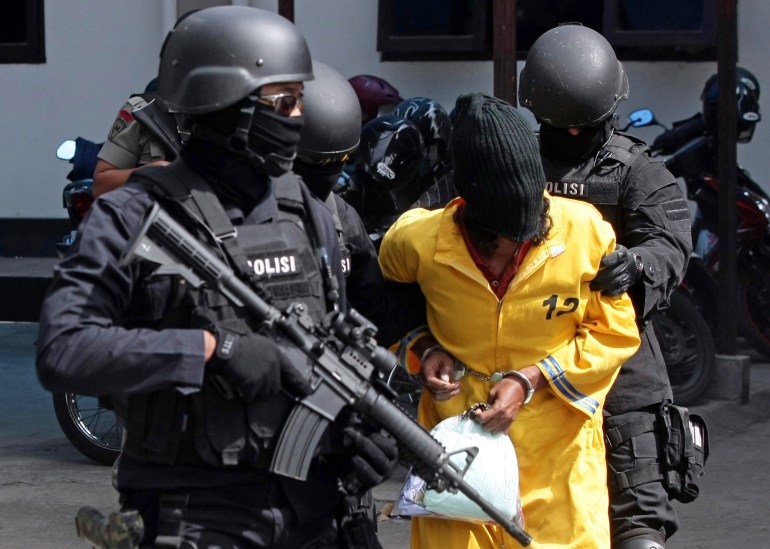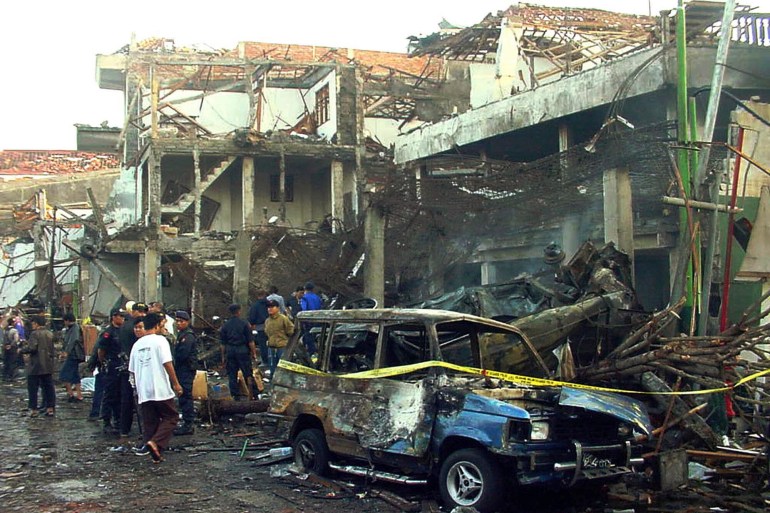Medan, Indonesia — As Indonesia marks 20 years since the Bali attacks, some of those convicted in connection with the attacks, which killed more than 200 people, say they have given up their hardline leanings, drawing attention to efforts to deradicalization of the country.
Umar Patek, who was jailed for 20 years in 2012 for mixing some of the chemicals used in the October 12 attacks, which also injured more than 200 people, recently made headlines after it was revealed he might be eligible. for parole, in part because he completed a series of deradicalization programs while behind bars.
On the same day, Abu Bakar Bashir, the spiritual godfather of Jemaah Islamiyah (JI), the hardline group behind the 2002 bombings, attended a flag-raising ceremony as part of Indonesia’s Independence Day festivities. on August 17.
Bashir was released from prison in 2021 after serving 11 years of a 15-year sentence for funding hardline training camps. He was released after being granted the standard good conduct remission time and, although he had been considered for parole prior to his eventual release, he did not qualify because he refused to meet the criteria. .
To be paroled, convicts must renounce “terrorism” and swear allegiance to the Indonesian state, two commitments seen as litmus tests of whether a convict has been deradicalized.
Part of JI’s ethos centered around the desire to transform Indonesia, the world’s most populous Muslim nation, into an Islamic caliphate, which meant that JI often attacked the police and military, seen as symbols of the state, in their attacks.
While Indonesian authorities have used figures like Patek and Bashir as examples of how people can be effectively deradicalized, some are skeptical.
When reports surfaced that Patek might be eligible for parole after serving 11 years of a 20-year sentence, there was an uproar in Australia, home to 88 of those killed in the Bali bombings. Prime Minister Anthony Albanese said Australia planned to protest any possible release. Australian survivors of the bombing also expressed disbelief that Patek could have been successfully deradicalized in such a relatively short period of time.
But experts say deradicalization is complicated and different for everyone.
“The difficulty is that there is no proper systematic review of the studies that have been done on deradicalization in Indonesia and most people look at a small subset of deradicalization efforts in Indonesia,” Judith Jacob, Asia director at the risk and intelligence company Torchlight. he told Al Jazeera.
“Also, the term deradicalization is often confused with disengagement and is very confusing. Does it mean that an individual renounces all belief in a group’s ideology or simply a commitment to violence? Do they completely leave those networks and what does reintegration into mainstream society mean in that context? she added.
Evolving Focus
Indonesia embarked on deradicalization programs in the 1990s in response to the rise of groups like JI, founded in 1993 by Abu Bakar Bashir and Abdullah Sungkar.
Jacob says that in the years since then, the Indonesian government and Densus 88, the country’s elite counterterrorism unit, have gotten better at making programs more effective.
“Those programs were underfunded and basically built from scratch, with no understanding of the process, goals or desired outcomes,” he said.
However, in 2010, Densus 88 was incorporated into the BNPT (Indonesian National Counter Terrorism Agency) increasing staffing and resources across the board.

Still, Jacob, who prefers the term disengagement to deradicalization to describe the process of trying to turn a person away from extreme views, says such programs are not “a big priority” for Indonesia.
Since about 2016, the government has outsourced much of the work to civil society groups or prominent ex-combatants.
A former JI member, Arif Budi Setyawan, who was imprisoned for three years, told Al Jazeera that the “training” programs he underwent in prison, provided by the jail, BNPT and Densus 88, helped him change his way of thinking. be.
He spent two years and two months in prison after remission and was released in 2017.
“Deradicalization from prison has a personal approach that works with inmates every day, little by little,” he said. “This method, while slow, is effective enough for some convicts to change their mindset, from hating the state to being willing to accept and make peace with the state.”
The BNPT program was more structured, he said, and involved experts and academics from the fields of psychology, sociology and religion.
Unfortunately, Setyawan said, BNPT only organized about two or three activities per year, while Densus 88 carried out more intense activities through dialogue and discussion with convicts every month.
“These three models of deradicalization development are relatively effective for convicts who are beginning to open their minds while incarcerated. However, not all convicts are open-minded, because when they are in prison, they hate the state even more and do not want to join the training programs,” he said.
Success evaluation
Risk analyst Jacob warns that it’s also difficult to assess the relative success or failure of a program using data alone.
“If you expect former members of the group to completely renounce their beliefs and reintegrate into ‘moderate’ society, that is a difficult and unrealistic task. What needs to be taken into account for success is recidivism rates or people committing acts of violence who have gone through national government programs, civil society or local government courses,” he said.

According to BNPT data, 50 of the 850 people who had been jailed for terrorism-related offenses and were released after apparently giving up their hardline views, reoffended between 2002 and 2019, yielding a reoffending rate of just under 6 percent.
Jacob says that the criteria used to measure such data are vague, not only about the type of action that constitutes recidivism, but also about the number of people subject to a program and the type of elements included.
In ordinary criminal cases in 2019, the Ministry of Justice and Human Rights said the recidivism rate was 21 percent for property crimes, 13 percent for drug crimes and 4 percent for misdemeanors.
Rizka Nurul, a researcher at Ruang Obrol, an online platform that focuses on deradicalization in Indonesia through journalism and community building, told Al Jazeera that there is often a marked difference between government deradicalization programs and government deradicalization schemes. led by civil society organizations (CSOs).
“CSOs prefer to call them reintegration and disengagement programs. While the government still uses the term deradicalization. The government’s deradicalization program is now very diverse and different from the previous one, which was more ideological or financial in nature,” he said, adding that the government had more success with prominent JI members when it used a more flexible approach rather than engage in ideological debates with ex-radicalized.
“Today they tend to focus on community training and psychological support. For example, the process of ‘de-radicalisation’ of ideological figures such as Abu Bakar Bashir, is often achieved through humanistic public discussion and is no longer focused on religious debates”.
He adds, however, that while smaller, grassroots programs can provide a more tailored approach to deradicalization, these types of programs also have problems that can hinder rather than help an individual’s progress.
“CSOs take a more diverse approach because they are more flexible, but their weakness is that they may not be sustainable for a variety of reasons, including limited funds,” he said.
“Unsustainable programs have the potential to lead to recidivism because the individual may need more time, but the program can no longer accommodate them.”




